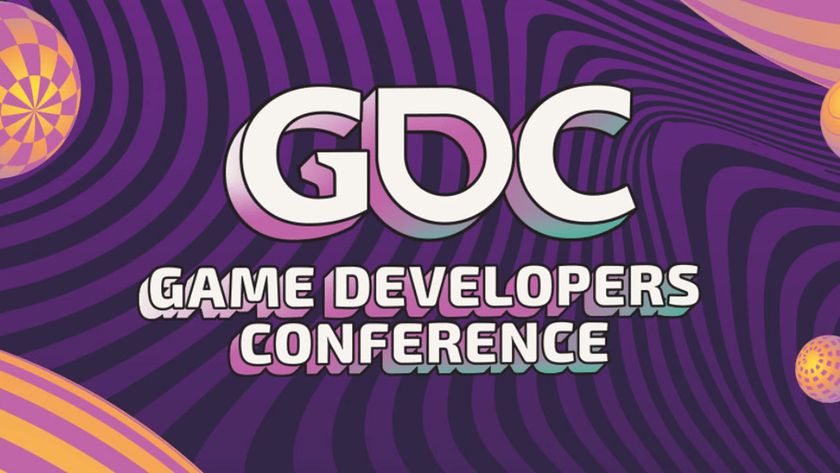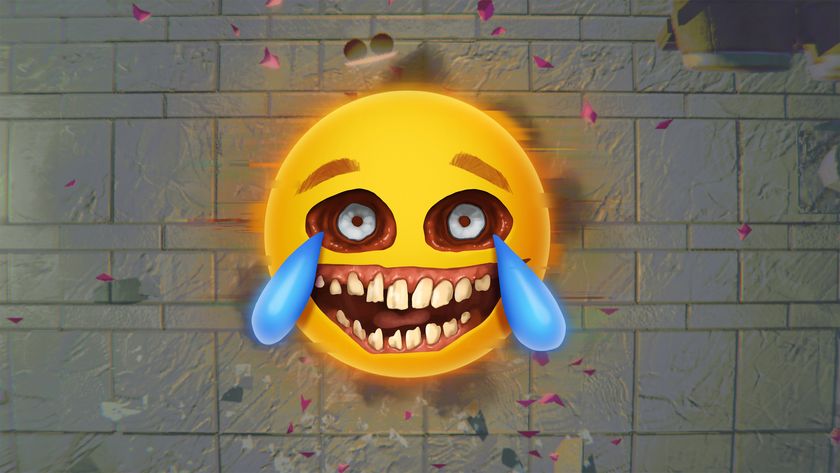Pivotal video game plot points you'll only find in DLC
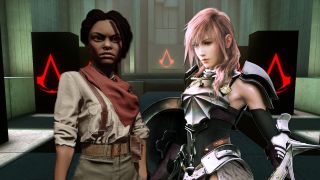
Did I miss something?
If you're like me, you beat a game and don't turn it off until the last credit rolls. I should say it's to appreciate the hard work of every undoubtedly exhausted soul who offered a blood and tear sacrifice to the game I just played, buuuut secret scenes don't hurt either. It's always fun when you get a hint about a sequel, or see some funny bit you otherwise would have missed, or get an explosive plot revelation that completely changes your understanding of the game you just played.
Yes, I know that last one doesn't happen ever, but what if it did? What if you could point to a game that was drastically altered not by a sequel or a tie-in, but by a piece of the story you were never supposed to touch until the rest was done - say, the kind you find in DLC. Well, that would just be downright confusing! Did I say would? I meant 'is', because there are DLC packs that act as the sole source of critical plot points that drastically change how players see certain games, based on whether they bought into the extra content or not. In fact, a few are coming to mind right now
This article is known by the state of California to contain SPOILERS for the following games: The Assassin's Creed series Asura's Wrath Final Fantasy XIII-2 Dead Space 3 BioShock Infinite Prince of Persia (2008) Castlevania: Lords of Shadow

Lucy's betrayal (Assassin's Creed Revelations: The Lost Archive)
The Plot Point: You know Desmond's dear friend Lucy Stillman, the girl who always had his back and seemed to return his unspoken but heartfelt affections? Yeeeah she was planning to screw him over big-time. A trip through a tangled mess of memories shared between Clay (the ill-fated fellow who left blood graffiti all over the Abstergo labs) and Lucy shows that she turned on the Assassins when she felt they'd abandoned her, and was working for the Templars all along. That's why wrathful ghost hag Juno has Desmond kill Lucy, not that Juno needs a reason to cause chaos and pain.
Without the DLC you'll sit there wondering what in the blue bloody hell happened. Also, you'll have no idea what Juno was rambling about when Desmond stabbed Lucy, because it's mentioned once in Revelations, and then just to confirm that it happened. Only in AC3 does Desmond bring up Lucy's betrayal, and in the sort of blas way one talks about last week's weather.
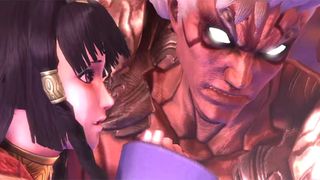
The real ending (Asura's Wrath: Episodes 19 - 22)
The Plot Point: In the sort of move that gets avid DLC decriers foaming at the mouth, Capcom infamously told fans of Asura's Wrath that if they wanted to see the end of their beloved story, they'd have to pony up for it. After Asura and Yasha defeat the source of all demon baddies in episode 18, episodes 19 - 22 introduce the true villain: that golden spider that's been following Asura around. Turns out he's an asshole god named Chakravartin who gave humans the magical soul MacGuffin and introduced demons to the world one upon a time. Asura doesn't take kindly to that and puts him in the ground, destroys mantra, the demons, and himself in one bittersweet epic win.
Without the DLC you see Asura and Yasha kill the giant face popping out of the planet, and that's pretty much it. They have no idea whether they've done anything substantial or not, and you still have to wonder if that damn spider is some metaphor you don't understand.
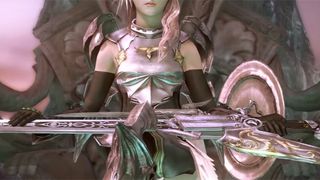
Where the hell everyone was (Final Fantasy XIII-2 DLC)
The Plot Point: At the beginning of Final Fantasy XIII-2, you learn that many of the protagonists from the previous game have vanished in some fashion, and you have no idea where they are or what they're getting up to. By the end of Final Fantasy XIII-2, you still don't know, because that's what the game's three DLCs are for. Each one clarifies what Lightning, Snow, and Sazh were doing instead of helping Serah and Noel save the world. And boy was it important stuff, like fighting in metaphysical space brawls and gambling in an otherworldly casino. Or, in Lightning's case, forcing herself into stasis so her late sister's memory will always be preserved within her. Err, yeah.
Without the DLC all you know is that characters pop out of the timestream and vanish just as fast, Snow has a terrible haircut, Sazh shows up in the last ten seconds for his contracted cameo, and the game ends on an image of Lightning turned into a rock for reasons you cannot begin to fathom.

The attack on Earth (Dead Space 3: Awakened)
The Plot Point: Dead Space 3 ends about as happily as one could hope for. The big bad literal moon monster's destroyed, Ellie's saved, and against all odds Isaac's implied to have survived certain death. Hooray! Things take a sudden but inevitable nosedive though when Isaac and Carver, while trying to find a way to get back to Earth, realize that the Brethren Moons already know where Earth is and are headed their right freaking now. The two manage to jerry-rig a proper propulsion device for their scavenged ship and get back to Earth, only to discover that the Necromorphs are already slaughtering the people of the planet, moments before a Brethren Moon slams into their ship and puts them down for the count. Would it really be Dead Space if they caught a break?
Without the DLC it looks like things turned out all right! The Necromorphs and Brethren Moons no longer threaten the Earth, and everyone worth caring about made it out okay. Good for them! They deserve a happy ending
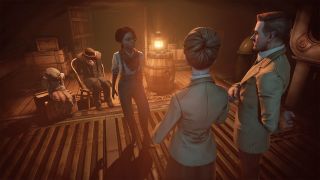
Daisy's plot (BioShock Infinite: Burial at Sea Part 2)
The Plot Point: In the midst of a transdimensional fetch quest, Elizabeth bops from Rapture into Columbia and finds herself in Fink Manufacturing at the same time she and Booker were there during BioShock Infinite. This doesn't lead to any hilarious Scooby-Doo style hijinks involving mistaken identity and an impractical amount of doors, but it does put Liz right in Daisy's base of operations. While there, she witnesses the Vox leader in conversation with the Luteces, who say that ensuring Comstock's downfall demands that Daisy let herself be killed by Elizabeth whoa wait what. Turns out Daisy was never actually going to kill the little boy in the factory, and it was all an act to do her part for the kill-that-bastard-Comstock effort.
Without the DLC it looks like the demands of revolution did a number on Daisy's moral compass and Elizabeth had to take drastic action to save an innocent child. Well damn, seems Daisy turned out to be corrup - wait. Who put this can of worms here?
![The Prince's rationale (Prince of Persia [2008]: Epilogue)](https://cdn.mos.cms.futurecdn.net/015a915a31f65a8572fbced1247f6ca1-320-80.jpg)
The Prince's rationale (Prince of Persia [2008]: Epilogue)
The Plot Point: Say what you will about how the Prince of Persia reboot ended, it certainly wasn't predictable. After Elika and the Prince save the day at the cost of the formers life, the Prince does something shockingly unheroic by undoing all their hard work and dooming the universe to get her back. His behavior's never excused, and it's a touchingly human choice until the DLC. Turns out that the Prince was being completely logical all along and knew that Elika was the only one who could actually kill the big bad, while her death would only seal it away temporarily. Well, that's nice and rational I guess.
Without the DLC while you may hate the Prince for destroying everything you did because of his dumb feelings, it's not often you see a video game lead fail in a sympathetic way. The choice was wrong, but you can understand it and empathize with him, and letting the protagonist fall to his own tragic flaw is easily the coolest thing the game does. Wow, this is actually awesome! Good going, writers! Or, er, until you 'fixed' it.

Gabriel's fate (Castlevania: Lords of Shadow: Reverie and Resurrection)
The Plot Point: You may have noticed at the end of Lords of Shadow that Gabriel's suddenly a vampire. Dont worry about opening a YouTube tab, you didn't miss anything: the game really does jump from the aftermath of the big bad's defeat, right to Gabriel as a vampire with no explanation at all. Turns out it's all there in the DLC, where Gabriel goes on a quest to defeat an old-as-hell evil that re-emerged in the wake of his jaunt through hell. Seems like a decent enough thing to do, cleaning up his messes and all. But as tends to happen when Gabriel Belmont does anything ever, there are horrible consequences for his thoroughly noble actions. In this case, he's turned into one of the living dead to even get the journey going, and exposure to the hellish jerkface he's pursuing corrupts his immortal soul. Hence, Dracula.
Without the DLC Wait, what's going on? Who's the gray guy with the weird hair? Wait, Gabriel? And, whoa wait, they're in an obviously modern now? And he just turned into bats? I what?

It all makes sense now!
Whether these downloadable revelations ultimately help or hurt their games is up to... let's say contentious interpretation. Maybe you think these DLCs are just merciless cash grabs in their native habitat, or legitimately worthwhile additions to your favorite games. Oh man, you know where would be a great place to talk about that, discuss painfully plot-ful DLC I missed, or freak about plot-lines that suddenly make sense? The comments sections below. Yeah, that place rules.
Can't get enough DLC content? Well, that's an expensive problem. Alleviate it a little with The 8 worst uses of DLC in gaming history or 7 DLC costumes and the characters who wore them best.

Former Associate Editor at GamesRadar, Ashley is now Lead Writer at Respawn working on Apex Legends. She's a lover of FPS titles, horror games, and stealth games. If you can see her, you're already dead.

